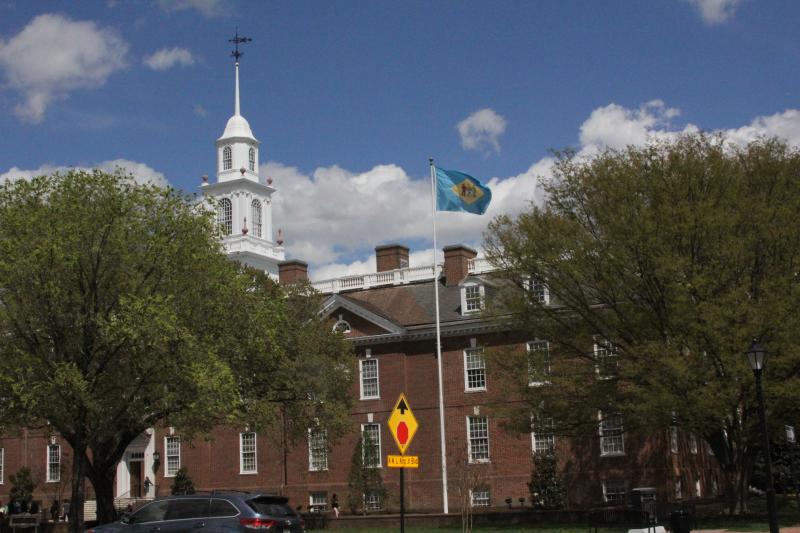Automatic voter registration through DMV sought
A bill that would automatically register anyone receiving a license or identification card at the Division of Motor Vehicles awaits action in the House.
The bill moved through the House Administration committee April 20; it passed the Senate March 30 by a vote of 14-7. It is on the House agenda for a full vote Tuesday, May 18.
Senate Bill 5 would create an automatic vote registration system at the DMV and grant the state election commissioner the authority to implement automatic voter registration at other state agencies that already offer voter registration services.
An unregistered adult citizen eligible to register who provides proof of U.S. citizenship during a DMV license or identification card transaction would be automatically registered to vote by the Department of Elections.
People who register to vote under this automatic system but do not identify a specific political party would be able to affiliate at the polls during the primary election immediately following their registration.
Unregistered individuals who do not provide proof of U.S. citizenship or proof of non-citizenship during a license or identification card transaction would be offered the opportunity to register to vote during the DMV transaction only if they affirm citizenship and other eligibility requirements, consistent with federal law requirements and existing law.
Bill continues virtual meetings
A bill that would allow advisory bodies to permanently hold virtual meetings if there is an anchor location open to the public passed the Senate on May 13 and awaits action in House committee.
Senate Bill 94 would make permanent changes to Delaware's Freedom of Information Act to allow public bodies to offer virtual meetings. The bill requires 2/3 vote of each house of the General Assembly because it would require a charter amendment by a municipal corporation.
The bill passed the Senate 19-2 and now awaits action in the House Administration Committee.
Hair discrimination targeted by law
A bill that prohibits discrimination based on a person's hairstyle was signed into law April 14.
Gov. John Carney signed the bill which unanimously passed the House April 1 after unanimously passing the Senate in January.
Senate Bill 32 protects hairstyles that include braids, locks and twists so anyone with those hairstyles cannot be discriminated against.
State contracts for public works would be required to follow the law, according to the bill.
Bill would change primary elections
A bill that would move Delaware's primary elections to the fourth Tuesday in April is up for a full vote in the House.
House Bill 30 would move primary elections for statewide office, counties and municipalities from September to the same day that the presidential primary is held. The closed period in which a voter is not allowed to change his or her political affiliation would also match the 60-day limit for presidential primaries. The deadline for minor political parties selecting a candidate would change to before the fourth Tuesday in April. The bill moved out of committee April 20 and is on the House agenda for a full vote Tuesday, May 18.
Telehealth Act moved awaits Senate action
The Telehealth Access Preservation and Modernization Act of 2021 awaits action in the Senate.
The act adopts the Interstate Medical Licensure Compact in Delaware, joining 29 states that are already members, including Maryland. Pennsylvania is in process of implementing the compact and New Jersey has introduced IMLC legislation. The compact creates a voluntary, expedited pathway to state licensure for physicians who want to practice medicine in multiple states. The compact does not change the scope of Delaware’s authority to regulate physician practice under the existing Medical Practice Act. It simply creates another pathway for licensure. The long-term benefits of telehealth are best realized when accompanied by cross-state medical licensure capabilities available through adoption of the Interstate Medical Licensure Compact, according to the bill.
The bill unanimously passed the House on April 29, and moved through a Senate committee on May 13. It awaits action by the full Senate.
Clean Slate Act awaits House committee action
A bill that creates an automatic expungement process for adult and juvenile charges that are eligible for mandatory expungement awaits action in House committeel.
Under the petition-based system, the bill states, only a small fraction of people eligible for expungement ever obtain this relief. Under this Act, the State Bureau of Identification must identify and expunge cases eligible for automatic mandatory expungement on a monthly basis. This Act is effective immediately and will be implemented on August 1, 2024. A fiscal note with the bill includes 11 new positions for about $600,000 in recurring personnel costs, and about $70,000 in recurring costs for rent and utilities.
The bill unanimously passed the Senate April 29 and will be heard in the House Judiciary Committee on May 19.
Bill expands expungement
A bill that would expand expungement for juveniles charged with crimes awaits action in the House Judiciary Committee.
Senate Bill 112 would align expungement eligibility of juveniles with those allowed for adults. The bill would also allow mandatory expungement for those charged with underage possession or consumption of alcohol; possession of marijuana; or possession of drug paraphernalia. The bill awaits consideration in the House.
The bill unanimously passed the Senate April 27. The House Judiciary Committee will meet on May 19.
Pharmacy contraception bill unanimously passes Senate
A bill that would allow pharmacists to dispense contraceptives without a prescription unanimously passed the Senate April 27 and awaits action in House committee.
Senate Bill 105 provides a standing order for pharmacists to administer “injectable hormonal contraceptives” after the pharmacist determines the patient meets the requirements. This includes the length of time a person may receive contraceptives without examination by a healthcare provider.
The bill awaits action in the House Health and Human Development Committee.
Clean water bill passes House
The Clean Water for Delaware Act unanimously passed the House April 1 and now moves to the Senate.
HB 200 establishes a framework for planning and projects to improve the quality of the state's water supply and waterways. A Delaware Clean Water Trust account will be created as a funding source for executing projects; it will be overseen by a Clean Water Trust Oversight Committee.
The bill awaits action in the Senate Environment & Energy Committee.
Electric vehicle bill establishes charging fee
A bill that would create a fee for charging electric vehicles at state facilities moved through a House committee March 23 after clearing the Senate 20-1 on Jan. 28.
Senate Bill 21 would amend the Delaware Energy Act by creating more accessible electric vehicle infrastructure, and allow state agencies to charge a fee for public or employee use.
The fees would not exceed the agency's costs, and the bill limits affected sites to state-owned or state-leased properties.
The bill awaits action in the House.
Bill allows tax deduction for college savings
A bill that would allow families to deduct up to $1,000 for college savings account contributions moved out of committee awaits action in House committee.
House Bill 145 allows up to $1,000 in contributions to a 529 College Savings Plan or another Delaware-sponsored qualified tuition program to be deducted from taxable income. The bill also allows a tax deduction up to $5,000 for a Delaware-sponsored ABLE program for special needs individuals.
The bill awaits action in the House Appropriations Committee.
Bike bill codifies road rules
A bill that would require bicyclists to yield at an intersection moved through committee April 21 and awaits action in the House.
House Bill 121 would require a bicycle operator to reduce speed when approaching a stop sign at an intersection with a roadway having two or fewer lanes for moving traffic. The bill makes law language in Delaware Code that was set to expire Oct. 5, 2021.
Code states if required for safety, a bicyclist must stop before entering an intersection. After slowing to a reasonable speed or stopping, the person shall yield the right-of-way to any vehicle in the intersection or approaching on another roadway so closely as to constitute an immediate hazard.
A person, after slowing to a reasonable speed and yielding the right-of-way if required, may cautiously make a turn or proceed through the intersection without stopping.
Snow and ice bill moves out of committee
A bill that would impose penalties for anyone who fails to clear off snow and ice from their vehicle awaits action in the Senate.
Senate Bill 64 creates a civil penalty for each instance where snow or ice dislodges from a moving vehicle and causes property damage or physical injury. Fines start at $25, and increase if there is physical or property damage. Noncommercial drivers would face fines of $200-$1,000 for each occurrence; those operating a commercial vehicle would be subject to $500-$1,000 fines.
Bill to increase tax on highest earners on hold
A bill that would create four income brackets with higher tax rates for the state's wealthiest earners awaits action in committee.
House Bill 64, sponsored by Rep. John Kowalko, D-Newark, creates four tax brackets for those annually earning $60,000 to $125,000; $125,000 to $250,000; $250,000 to $500,000; and over $500,000.
Those who make $60,000-$125,000 would pay a tax rate of 6.6 percent; $125,000-$250,000 would pay 7.1 percent; $250,000-$500,000 would pay 7.85 percent; and those making more than $500,000 would be taxed at 8.6 percent.
The current top tax rate is 6.6 percent for anyone making more than $60,000 per year.
The bill was introduced in January and awaits action in the House Revenue & Finance Committee.
Pledge of Allegiance bill tabled
A bill that would remove criminal penalties for teachers who fail to require students to salute and pledge allegiance to the flag has been tabled in committee.
House Bill 107 would amend Delaware law related to First Amendment rights of public school students. Current Delaware law, which requires teachers and students to salute and pledge allegiance to the American flag every morning, is unconstitutional because it is coercive, the bill states.
This bill, sponsored by Rep. Paul Baumbach, D-Newark, preserves the requirement that students have the opportunity to salute and pledge allegiance to the American flag each school day but revises the code so that the requirement complies with the First Amendment of the U.S. Constitution.
It was tabled March 17 in the House Education Committee.





















































